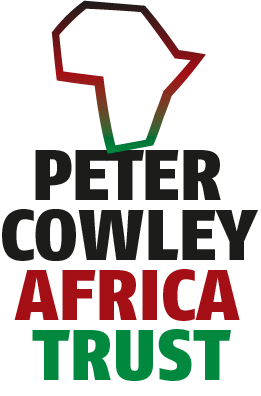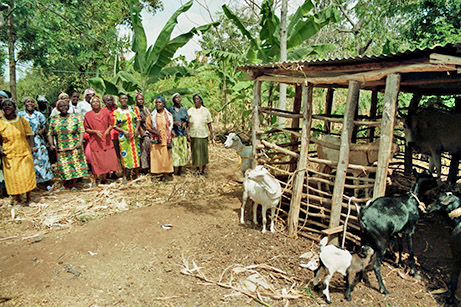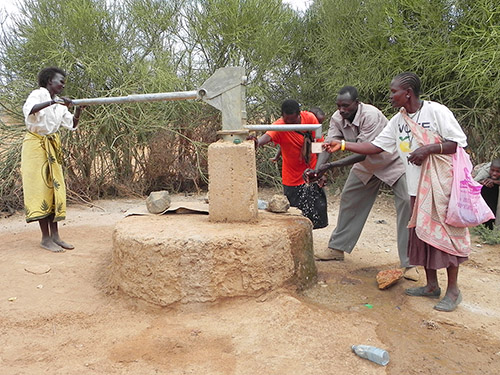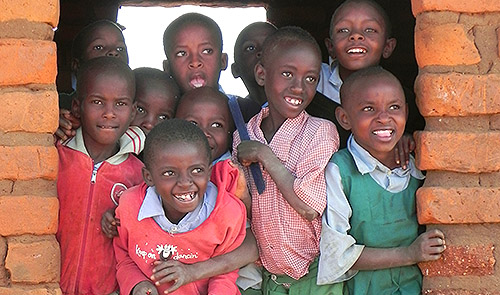



PCAT’s grants focus on three key priorities. These have been identified by PCAT’s local partners as being able to make the most impact in the areas in which PCAT’s partners agencies work.
In the rural areas where two of PCAT’s partners work most households earn their living from small scale subsistence agriculture. Farms are typically two to four acres. The main crops grown are maize, beans, green grams, cowpeas and pigeon peas. In Mbeere many families also keep goats.

Kamwimbi women's self-help group, with some of the goats purchased through a Trust grant. The goats are an improved breed with a much higher production of milk than with traditional goat breeds.
Climate change has seriously affected people’s livelihoods. Both areas have suffered from prolonged droughts over recent years. Few farmers are able to practise irrigation, access to credit is poor, and farmers lack the necessary organisation to negotiate effectively with traders when selling surplus crops. 65% of the population of Mbeere live on less than £1 per day. More…
Two of PCAT’s partners work in semi-arid areas of eastern Kenya. Many families rely on seasonal rivers which may dry up when there is no rain. Others collect water from water sources which may also be used by cattle and goats and the water is not safe to drink. Few homes have access to piped water. Many have no nearby borehole. For most families hours are spent collecting water. The collection and storage of rainwater is an important source of water for domestic purposes. Having a sufficiently large water storage tank can provide a water supply for a family between the rainy seasons. Gutters and storage tanks for schools can reduce the need for students to collect water.More…

A village borehole provides a safe water resource and releases people from the everyday task of collecting water from unreliable sources.
Although both primary and secondary education is free families still have to meet the cost of providing basic school facilities and school equipment. Many schools in rural areas have no electricity or access to piped water. Collecting water is a regular part of the school day for many students.

Improving school buildings enables a more consistent education.
Many poor families in rural areas are unable to afford school fees. This is a particular problem during periods of drought when family incomes drop. Inability to meet basic school fees can mean students may miss school. The result is that education for many students may be interrupted with a consequent impact on educational attainment in the all important exams at the end of their four years of secondary school education. More…
In the rural areas where two of PCAT’s partners work most households earn their living from small scale subsistence agriculture. Farms are typically two to four acres. The main crops grown are maize, beans, green grams, cowpeas and pigeon peas. In Mbeere many families also keep goats.

Kamwimbi women's self-help group, with some of the goats purchased through a Trust grant. The goats are an improved breed with a much higher production of milk than with traditional goat breeds.
Climate change has seriously affected people’s livelihoods. Both areas have suffered from prolonged droughts over recent years. Few farmers are able to practise irrigation, access to credit is poor, and farmers lack the necessary organisation to negotiate effectively with traders when selling surplus crops. 65% of the population of Mbeere live on less than £1 per day. More…
Two of PCAT’s partners work in semi-arid areas of eastern Kenya. Many families rely on seasonal rivers which may dry up when there is no rain. Others collect water from water sources which may also be used by cattle and goats and the water is not safe to drink. Few homes have access to piped water. Many have no nearby borehole. For most families hours are spent collecting water. The collection and storage of rainwater is an important source of water for domestic purposes. Having a sufficiently large water storage tank can provide a water supply for a family between the rainy seasons. Gutters and storage tanks for schools can reduce the need for students to collect water.More…

A village borehole provides a safe water resource and releases people from the everyday task of collecting water from unreliable sources.
Although both primary and secondary education is free families still have to meet the cost of providing basic school facilities and school equipment. Many schools in rural areas have no electricity or access to piped water. Collecting water is a regular part of the school day for many students.

Improving school buildings enables a more consistent education.
Many poor families in rural areas are unable to afford school fees. This is a particular problem during periods of drought when family incomes drop. Inability to meet basic school fees can mean students may miss school. The result is that education for many students may be interrupted with a consequent impact on educational attainment in the all important exams at the end of their four years of secondary school education. More…
 PETER COWLEY AFRICA TRUST IS A REGISTERED CHARITY NO: 1037257
PETER COWLEY AFRICA TRUST IS A REGISTERED CHARITY NO: 1037257